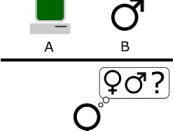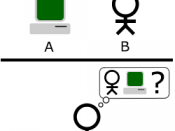The idea of the robot replacing the need for human intelligence is a startling thought. Could these machines develop beyond our control? This section explains what Artificial Intelligence is and the scientific skills involved.
What is Artificial Intelligence (A.I.)?
The term Artificial Intelligence was first coined by John McCarthy in 1956 when he proposed that "intelligence can in principle be so precisely described that a machine can be made to simulate it." He now defines A.I. as "the science and engineering of making intelligent machines, especially intelligent computer programs." A.I. is generally associated with Computer Science, but it has many important links with other fields such as Maths, Psychology, Cognition, Biology and Philosophy, among many others.
Strong and Weak A.I.
Artificial Intelligence is often divided into two classes: Strong A.I. and Weak A.I.. Strong A.I. makes the bold claim that computers can be made to think on a level at least equal to humans; that they are capable of cognitive mental states.
This is the kind of A.I. that is portrayed in movies like Blade Runner and more recently A.I.. Weak A.I. simply states that some "thinking-like" features can be added to computers to make them more useful tools; that machines can simulate human cognition, in other words act as if they are intelligent. This has already started to happen, for example, speech recognition software.
The Turing Test
The 'Turing Test' is an experiment suggested by mathematician Alan Turing in his 1950 paper Computing Machinery and Intelligence. He argued that if a machine could successfully pretend to be human to a knowledgeable observer, then you certainly should consider it intelligent. In the Turing test, a judge has conversations via teletype, with two systems, one human, the other a machine. The conversations can be about anything, and proceed for a set...



Interesting stuff
Thought provoking and informative. A bit too short though, could be further expanded upon
1 out of 1 people found this comment useful.